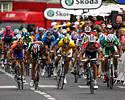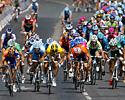
Recently on Cyclingnews.com |
View from the lab - Ric Stern's Tour de France sports science
|
|
British ABCC coach Ric Stern (www.cyclecoach.com) is a regular contributor to Cyclingnews' Form & Fitness section along with being a full time coach. Still an active rider when time allows, Ric will be providing a physiological insight into the challenges that face the riders in the Tour.
July 7, 2006: The art of sprinting

|
Two days, two sprints, and two different winners! The last two days the Tour has ended in a bunch sprint after sweeping up any breakaways that had gone up the road. For the sprinters it's important to get stage victories early in the Tour, before the time trials and mountains start. This is because the sprinters may not get through the mountains – which can be very arduous.
On an initial look, you may think that with all the power that the sprinters can generate (which could be up to 1800 plus watts) that they'd have plenty of power to get up the mountains. This, however, isn't the case. The power that the sprinters can generate can only be maintained for seconds. Climbing mountains on the other hand, can take up to an hour at a time. Here sustainable power (which is a function of lactate threshold, and MAP/VO2max) and the rider's mass are the prime determinants of mountain power. It's likely that the sprinters sustainable power is relatively low combined with a higher mass than the climbers, and simple physics and common sense tells us that this means the heavier and less powerful (in terms of sustainability) a rider is, the slower they'll go. We'll look more closely at this when the race hits the mountains.
Sprinting is made up of several components, some obvious and others less so.
1) Conserving energy for the final dash to the line
2) A high peak power
3) Tactics/skill
4) Bravery
Conserving energy is extremely important if you want to do well as a sprinter. The general idea is that you have a team who drives on the front – to keep breakaways in check or prevent them from escaping and to guide you through the final mayhem in the last few hundred metres prior to you unleashing your sprint. Your domestiques will need to ensure you have a smooth ride and get you to the front with about 200 metres to go. You can practice these skills and drills, and riding closely on the wheels on a group training ride and getting your team mates to up the pace and peel off (carefully, watch for traffic) and then let you and the other sprinters duke it out for a specified point.
Crucially, the most important aspect of sprinting is fitness – as it is with any aspect of bike racing. With sprinting, fitness can be defined with the highest 5-second peak power that you can generate, as well as the power you can generate over the final ~30-secs of a race. If you can't generate big power numbers then it's highly unlikely that no matter what your other sprinting skills are like, they'll be meaningless. Good (male) road sprinters will need to generate in excess of 18 W/kg to be in with a good chance of taking a sprint. Thus, if you had a mass of 70 kg you'd need to be able to generate ~1250 W over 5-secs. You can improve your sprinting (no matter how good or bad you are at sprinting) with a couple of exercises.
a) From a rolling start of about 35 km/hr, in a moderate sized gear, get out of the saddle and sprint hard for ~5-seconds, then return to the saddle and carry on sprinting for a further ~10-secs.
b) From stationary (or close to stationary) and in a low gear (such as 39 x 19), stamp down on the pedals while remaining seated. After a couple seconds you'll start to spin out – don't change up or get out of the saddle, completing ~10-secs.

|
During a long ride you can incorporate quite a few of these sprints interspersed with a good recovery period
Tactics. No matter how good you are at sprinting (e.g., peak power) if you use poor or poorly timed tactics you'll be blown away at the finish. For e.g., we can see that in stage 5 of the Tour, Robbie McEwen's team started the sprint too early leaving McEwen in the wrong place and failing to get the victory. You need to know whether you're better at short or long sprints and to adjust your tactics accordingly. Also, you'll need to be able to pick the right wheel to be on – ensure you're on the wheel of another sprinter and not a climber who is near the front… Timing when you come off someone's wheel and into the wind are something that can take a while to learn, but you need to practice this (if you want to do well at sprinting).
Bravery. Non-sprinters may call it “stupidity”, but simply, if you're going to contest sprints you don't to be afraid. There's plenty of bumping, close contact, and the ever-present risk of crashing at high speed.
Finally, to be good at sprinting you need to practice all of it, tactics, fitness, conserving energy, etc. you can do this in training races as well as low priority races.

